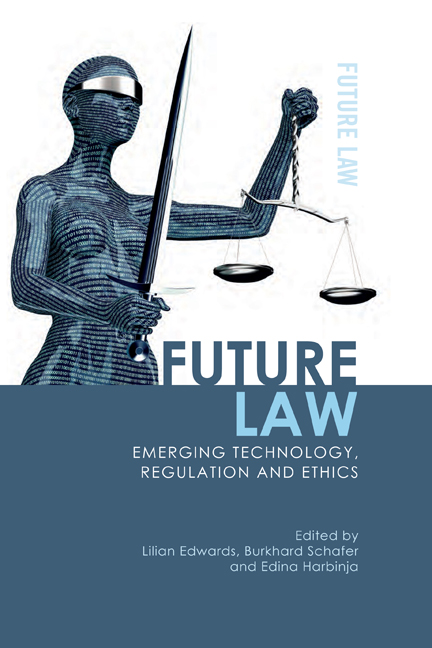Book contents
- Frontmatter
- Contents
- List of Contributors
- List of Figures and Tables
- Table of Cases
- Table of Legislation
- 1 The Future’s Already Here: It’s Just Unevenly Edited
- Part I From Privacy and Princesses, to Security and Star Wars
- 2 Privacy and Identity through the Eyes of Disney Princesses
- 3 White Noise from the White Goods? Privacy by Design for Ambient Domestic Computing
- 4 Citizen-consumers in a Personalised Galaxy: Emotion-influenced Decision Making, a True Path to the Dark Side?
- 5 Big Data Ethics: Darth Vader and the Green Cross Man
- 6 Security Vulnerabilities, Backdoors, Exploits and the Marketplace for Each: The Return of Boba Fett – Bug Bounty Hunter in the New Republic
- Part II A Matter of (Future) Life and Death
- 7 Will My Genes Really Help Me Fit Into Those Jeans? Personal Genomics and Wrap Contracts
- 8 On Living and Undead Wills: ZombAIs, Technology and the Future of Inheritance Law
- 9 ‘Be Right Back’: What Rights Do We Have over Post-mortem Avatars of Ourselves?
- Part III Regulating Autonomous Technologies: Software Are Doing it for Themselves
- 10 Autonomous Intelligent Agents and the Roman Law of Slavery
- 11 Autonomous Vehicles: An Analysis of the Regulatory and Legal Landscape
- Part IV Textual Poaching: Copyright in a Remixed World
- 12 Living in a Remixed World: Comparative Analysis of Transformative Uses in Copyright Law
- 13 Repost This: Instagram and the Art of Re-photography
- Index
8 - On Living and Undead Wills: ZombAIs, Technology and the Future of Inheritance Law
Published online by Cambridge University Press: 17 September 2020
- Frontmatter
- Contents
- List of Contributors
- List of Figures and Tables
- Table of Cases
- Table of Legislation
- 1 The Future’s Already Here: It’s Just Unevenly Edited
- Part I From Privacy and Princesses, to Security and Star Wars
- 2 Privacy and Identity through the Eyes of Disney Princesses
- 3 White Noise from the White Goods? Privacy by Design for Ambient Domestic Computing
- 4 Citizen-consumers in a Personalised Galaxy: Emotion-influenced Decision Making, a True Path to the Dark Side?
- 5 Big Data Ethics: Darth Vader and the Green Cross Man
- 6 Security Vulnerabilities, Backdoors, Exploits and the Marketplace for Each: The Return of Boba Fett – Bug Bounty Hunter in the New Republic
- Part II A Matter of (Future) Life and Death
- 7 Will My Genes Really Help Me Fit Into Those Jeans? Personal Genomics and Wrap Contracts
- 8 On Living and Undead Wills: ZombAIs, Technology and the Future of Inheritance Law
- 9 ‘Be Right Back’: What Rights Do We Have over Post-mortem Avatars of Ourselves?
- Part III Regulating Autonomous Technologies: Software Are Doing it for Themselves
- 10 Autonomous Intelligent Agents and the Roman Law of Slavery
- 11 Autonomous Vehicles: An Analysis of the Regulatory and Legal Landscape
- Part IV Textual Poaching: Copyright in a Remixed World
- 12 Living in a Remixed World: Comparative Analysis of Transformative Uses in Copyright Law
- 13 Repost This: Instagram and the Art of Re-photography
- Index
Summary
Behind every man now alive stand 30 ghosts, for that is the ratio by which the dead outnumber the living.
Arthur C Clarke, 2001: A Space OdysseyIntroduction
This chapter builds on earlier work on how AI could change the way in which we pass on property to the next generation, increasing potentially the control that we can exercise over the disposition of our estate. Communicating (uni-directionally) with a world in which we no longer exist has been possible ever since the invention of writing, but until recently this process has remained inevitably static and one-sided: I can create a fixed message, a letter or more recently a voice or video recording, which will be read or played after my demise, but the reader or listener can't engage in a discussion with me, ask questions in case of ambiguities, and neither can I adjust the message to changed circumstances and conditions. It is this limitation that more intelligent technologies are beginning to probe. This chapter discusses some of the implications for the law that autonomous systems could pose, systems that replicate not just the way the deceased looked (as in Tupac's post-mortem ‘holographic’ performance) but also the way they thought and argued. The earlier paper focused on ensuring that the intentions of the testator, as they are now, are also observed after their death. This chapter takes some of the anthropological foundations of inheritance law that were only tangentially discussed in that paper more seriously, and by incorporating more recent technological developments it develops a more dynamic account, where the AI's machine learning (ML) continues after the death of its owner.
The chapter begins by putting the practice of will-making in a historical, sociological and psychological context. We need to understand the multiple aims people pursue when making wills to see how technology could soon turn us all into ‘digital pharaohs’, building pyramids of bits and bytes to be remembered by, but which will also potentially burden the next generation with their curation and preservation. We look first at the cross-cultural psychological underpinnings of memory and will-making, before briefly discussing the emergence of wills in Europe from the spirit of Roman law. From this we will take in particular the concept of ‘lares et penates’, the guiding spirits of the family as abstract objects, which we will later give a secularised, informational rendition as ‘family AIs’.
- Type
- Chapter
- Information
- Future LawEmerging Technology, Regulation and Ethics, pp. 225 - 261Publisher: Edinburgh University PressPrint publication year: 2020



